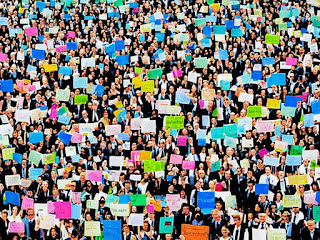 |
| To be human in the modern world |
Foreword
At the moment we live in an unsustainable socioeconomic system that requires infinite exponential growth with finite resources. To be able to live in such a system we require money and for most of us the primary way to obtain the money we need to live is working. We end up spending most of our lives working. A lot of the work we do is demoralising, dehumanising, and, could be argued, unnecessary. From when we leave the education system until we retire and the retirement age is getting higher and higher in many countries. Many people work two jobs to make ends meet.
Imagine the future
Instead of that, imagine a world where you didn’t need to work, or at least, you didn’t need to work as much as we do today. Those jobs that are needed to be done would be interesting, meaningful, and people who work at those jobs do so because they want to not because they need the money. Working less would mean more time to be human.
Sounds like fantasy? Maybe, but maybe not. EOS proposes a sustainable, moneyless, socioeconomic system that aims to balance our needs with those of nature. In doing so, we could have a system that requires much less work yet still offer a good standard of living for everyone. The system has its roots in the application of science and engineering. How would that work?
The Alternative
To start with, the system that EOS proposes would see society organised in to a people side and a technical side. The people side is all about community, family, and culture. The technical side deals with all the technical aspects of society. From the means of production like farms and factories to transport systems and on to the science and research needed to develop the society. The people side is run by the people through a process of direct democracy and the technical side is managed by interdisciplinary teams of people, each of whom is an expert in their relevant field.
The system EOS proposes is also moneyless. So there is no profit searching behaviours that drive our current destructive system. Instead, the production capacity of a society is divided equally between the people so everyone has an opportunity to gain what they want and what they need. We can do that if we have an accounting system and the one that EOS proposes is based on the physical capacity of society to produce. We can measure that using energy (or to be more exact the usable energy which is called exergy). We can then allocate a set number of energy credits (that represent the production capacity) to individuals who then decide on what gets produced by allocating energy credits (and, therefore, production) to produce items that they want produced. Thus, the system is demand driven and not centrally planed. The teams of experts then manage the system.
As the system is not money based and we are not seeking profit we don’t have a system that needs to continually grow exponentially in the self destructive way of today system. Instead, we have the opportunity to build sustainable products. Built to be recycled or reuse. We can also reduce what we produce. For example, instead of building car after car and then have them spend most of their time standing still in a garage or car park doing nothing. We could rethink our whole transport system and have a system where each car is used for, say, 80% of the time. That means we could reduce the amount of cars we need to produce.
In the system EOS proposes, as much as possible is automated. Robots in factories run by Artificial Intelligence (AI). With the teams of experts running the overall system. With AI and robots doing much of the work, we would have much less work to be done. And what work there is to do would be more interesting to do.
 |
| Building a better world |
Conclusion
Less work to do in a sustainable socioeconomic system where everyone has equal access to the means of production would mean more time to be human.
Do you want this kind of “Star Trek” like future? If you want to make this kind of future possible then we need to work together to achieve it. If it is possible to achieve then we can achieve it.
Links